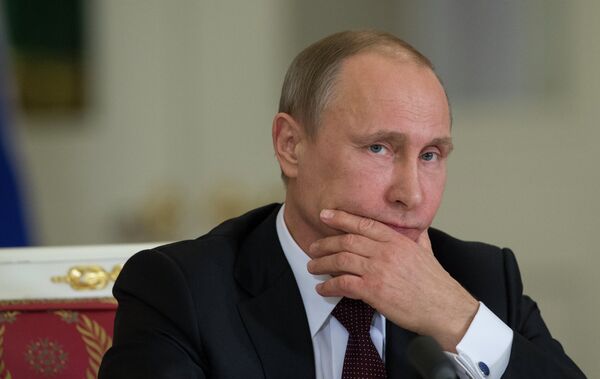MOSCOW, May 6 (RIA Novosti) – Tuesday marks the second year of Vladimir Putin’s third term as President of the Russian Federation, an anniversary that comes amid a turbulent time of tensions in Ukraine, a tightening pressure on Russia from the West and soaring approval ratings for Putin at home.
Putin’s career at the helm of the Russian government kicked off in 2000 when he served as acting President following the surprise resignation of Boris Yeltsin. The same year, Putin was inaugurated as president and four years later he was re-elected for a second term. He temporarily served as prime minister from 2008 to 2012, before returning to the presidency on May 7, 2012.
Many political analysts agreed that his third term would be a challenge for Putin, who was expected to guide the country to a new path of development in the following years.
OLYMPICS, CRIMEA, TWO FLOODS
On his first day as president in 2012, Putin passed a slew of presidential decrees that are commonly referred to as the May Decrees, which set long-range targets for the Russian economy.
The May Decrees largely summarized Putin’s manifesto released during the election campaign, including long-term reforms in the defense industry, the army, education, housing, healthcare, science and demography.
The decrees were billed as the top priority for the Putin administration and the newly-formed Cabinet, whose efficiency was often measured by how well it managed to live up to Putin’s commitments.
The second term of Putin’s presidency was strewn with a series of high-profile Cabinet reshuffles and resignations. Among the major appointments were the chiefs of the Central Bank of Russia, its Accounts Chamber, a Vice Prime Minister, and the head of Regional Development and Far Eastern Minister, as well as a host of aides and envoys.
Putin’s ability to take urgent decisions was tested in 2012 when flooding struck the southwestern region of Krasnodar killing 170 people, followed by a second major flood in Russia’s Far East affecting some 180,000 people.
The 2014 Olympic Games in the southern Russian city of Sochi was certainly one of the biggest triumphs in Russian sports history. Despite fears of terrorist attacks sparked by a twin suicide bombing in Volgograd in late 2013, the Games went off without a hitch and the International Olympic Committee later described them as the best in living memory. Russia topped the gold and overall medal counts, a striking victory that was overshadowed by the gathering storm clouds on the Ukrainian horizon.
Lightning struck in March of this year when the Russian-majority Crimean Peninsula on the Black Sea refused to recognize the regime in Kiev that came to power in a coup in February, voting to leave Ukraine for Russia, a move that angered the West, which had already sided with the Maidan movement.
SOARING RATINGS
Crimea’s reunification with Russia – decades after it was gifted to Ukraine on a Soviet ruler’s whim – sent Vladimir Putin’s rating at home soaring to record highs. According to Russia’s biggest pollster Vtsiom, in March 2014 his approval at home hit a record 70 percent, despite Russia bearing the weight of EU and US sanctions.
Putin continued his winning streak, topping global leader ratings for a second year running. In October 2013, he landed on top of Forbes’s Most Powerful People list.
Russian political analyst Alexei Konkov believes that Putin’s foreign policy in recent years has shown that Russia was prepared to defend its own interests on the global arena. It also proved that the Russian leader was able to maintain his balanced stance in crisis situations.
THE CHALLENGES TO COME
The anniversary of Putin’s presidency comes amid difficult times, both inside and outside Russia, according to Mikhail Remezov, Director of the Moscow-based Institute of National Strategy.
Remezov says Russia will have to go through a lot of change to free itself from the grip of sanctions. “We’re speaking about reforming our development model towards more self-reliance.”
The pundit believes the sanctions could prompt Russia to revisit its economic strategy to reduce its dependency on imports and boost growth rates.
The question is whether the country is capable of sustainable growth and a major overhaul, says Vladimir Slatinov of the Humanitarian and Political Research Institute.
“Russia won’t be able to pursue its ambitions, both in home and foreign politics, without its economy growing at a faster pace, without overhauling its infrastructure, in other words without what they call sustainable growth,” he told RIA Novosti.




